

النبات

مواضيع عامة في علم النبات

الجذور - السيقان - الأوراق

النباتات الوعائية واللاوعائية

البذور (مغطاة البذور - عاريات البذور)

الطحالب

النباتات الطبية


الحيوان

مواضيع عامة في علم الحيوان

علم التشريح

التنوع الإحيائي

البايلوجيا الخلوية


الأحياء المجهرية

البكتيريا

الفطريات

الطفيليات

الفايروسات


علم الأمراض

الاورام

الامراض الوراثية

الامراض المناعية

الامراض المدارية

اضطرابات الدورة الدموية

مواضيع عامة في علم الامراض

الحشرات


التقانة الإحيائية

مواضيع عامة في التقانة الإحيائية


التقنية الحيوية المكروبية

التقنية الحيوية والميكروبات

الفعاليات الحيوية

وراثة الاحياء المجهرية

تصنيف الاحياء المجهرية

الاحياء المجهرية في الطبيعة

أيض الاجهاد

التقنية الحيوية والبيئة

التقنية الحيوية والطب

التقنية الحيوية والزراعة

التقنية الحيوية والصناعة

التقنية الحيوية والطاقة

البحار والطحالب الصغيرة

عزل البروتين

هندسة الجينات


التقنية الحياتية النانوية

مفاهيم التقنية الحيوية النانوية

التراكيب النانوية والمجاهر المستخدمة في رؤيتها

تصنيع وتخليق المواد النانوية

تطبيقات التقنية النانوية والحيوية النانوية

الرقائق والمتحسسات الحيوية

المصفوفات المجهرية وحاسوب الدنا

اللقاحات

البيئة والتلوث


علم الأجنة

اعضاء التكاثر وتشكل الاعراس

الاخصاب

التشطر

العصيبة وتشكل الجسيدات

تشكل اللواحق الجنينية

تكون المعيدة وظهور الطبقات الجنينية

مقدمة لعلم الاجنة


الأحياء الجزيئي

مواضيع عامة في الاحياء الجزيئي


علم وظائف الأعضاء


الغدد

مواضيع عامة في الغدد

الغدد الصم و هرموناتها

الجسم تحت السريري

الغدة النخامية

الغدة الكظرية

الغدة التناسلية

الغدة الدرقية والجار الدرقية

الغدة البنكرياسية

الغدة الصنوبرية

مواضيع عامة في علم وظائف الاعضاء

الخلية الحيوانية

الجهاز العصبي

أعضاء الحس

الجهاز العضلي

السوائل الجسمية

الجهاز الدوري والليمف

الجهاز التنفسي

الجهاز الهضمي

الجهاز البولي


المضادات الحيوية

مواضيع عامة في المضادات الحيوية

مضادات البكتيريا

مضادات الفطريات

مضادات الطفيليات

مضادات الفايروسات

علم الخلية

الوراثة

الأحياء العامة

المناعة

التحليلات المرضية

الكيمياء الحيوية

مواضيع متنوعة أخرى

الانزيمات
?Can changes in the number of chromosomes affect health and development
المؤلف:
Genetics Home Reference
المصدر:
Help Me Understand Genetics
الجزء والصفحة:
12-10-2020
2888
Can changes in the number of chromosomes affect health and development?
Human cells normally contain 23 pairs of chromosomes, for a total of 46 chromosomes in each cell . A change in the number of chromosomes can cause problems with growth, development, and function of the body's systems. These changes can occur during the formation of reproductive cells (eggs and sperm), in early fetal development, or in any cell after birth. A gain or loss of chromosomes from the normal 46 is called aneuploidy.
A common form of aneuploidy is trisomy, or the presence of an extra chromosome in cells. "Tri-" is Greek for "three"; people with trisomy have three copies of a particular chromosome in cells instead of the normal two copies.
Down syndrome is an example of a condition caused by trisomy . People with Down syndrome typically have three copies of chromosome 21 in each cell, for a total of 47 chromosomes per cell.
Monosomy, or the loss of one chromosome in cells, is another kind of aneuploidy. "Mono-" is Greek for "one"; people with monosomy have one copy of a particular chromosome in cells instead of the normal two copies. Turner syndrome is a condition caused by monosomy . Women with Turner syndrome usually have only one copy of the X chromosome in every cell, for a total of 45 chromosomes per cell.
Rarely, some cells end up with complete extra sets of chromosomes. Cells with one additional set of chromosomes, for a total of 69 chromosomes, are called triploid . Cells with two additional sets of chromosomes, for a total of 92 chromosomes, are called tetraploid. A condition in which every cell in the body has an extra set of chromosomes is not compatible with life.
In some cases, a change in the number of chromosomes occurs only in certain cells. When an individual has two or more cell populations with a different chromosomal makeup, this situation is called chromosomal mosaicism . Chromosomal mosaicism occurs from an error in cell division in cells other than eggs and sperm. Most commonly, some cells end up with one extra or missing chromosome (for a total of 45 or 47 chromosomes per cell), while other cells have the usual 46 chromosomes. Mosaic Turner syndrome is one example of chromosomal mosaicism. In females with this condition, some cells have 45 chromosomes because they are missing one copy of the X chromosome, while other cells have the usual number of chromosomes.
Many cancer cells also have changes in their number of chromosomes. These changes are not inherited; they occur in somatic cells (cells other than eggs or sperm) during the formation or progression of a cancerous tumor.
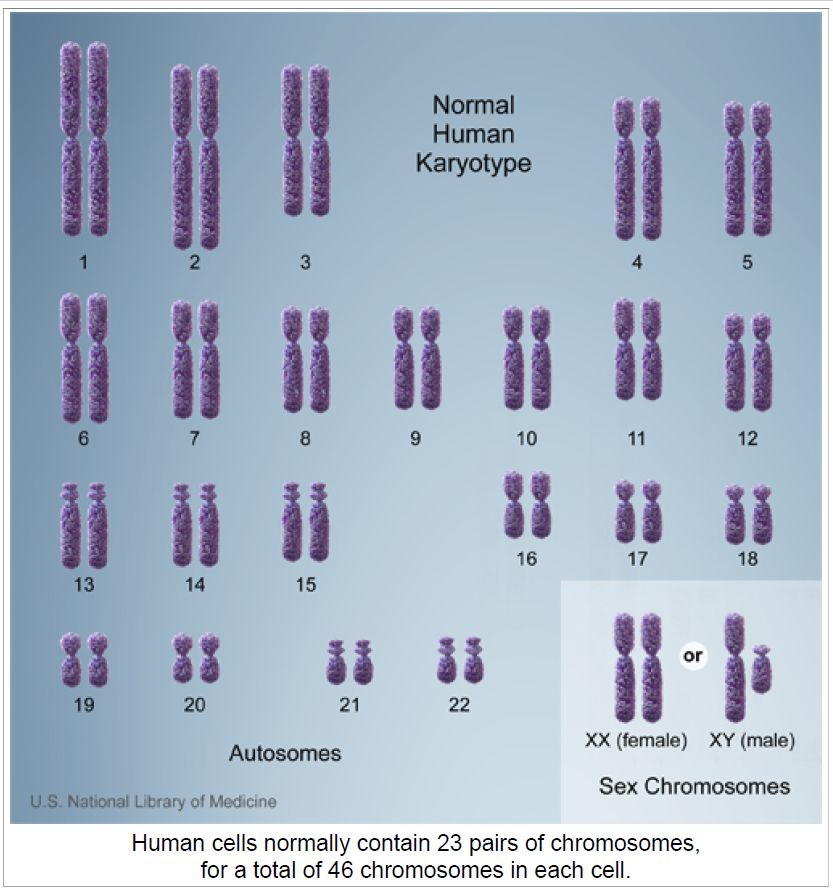
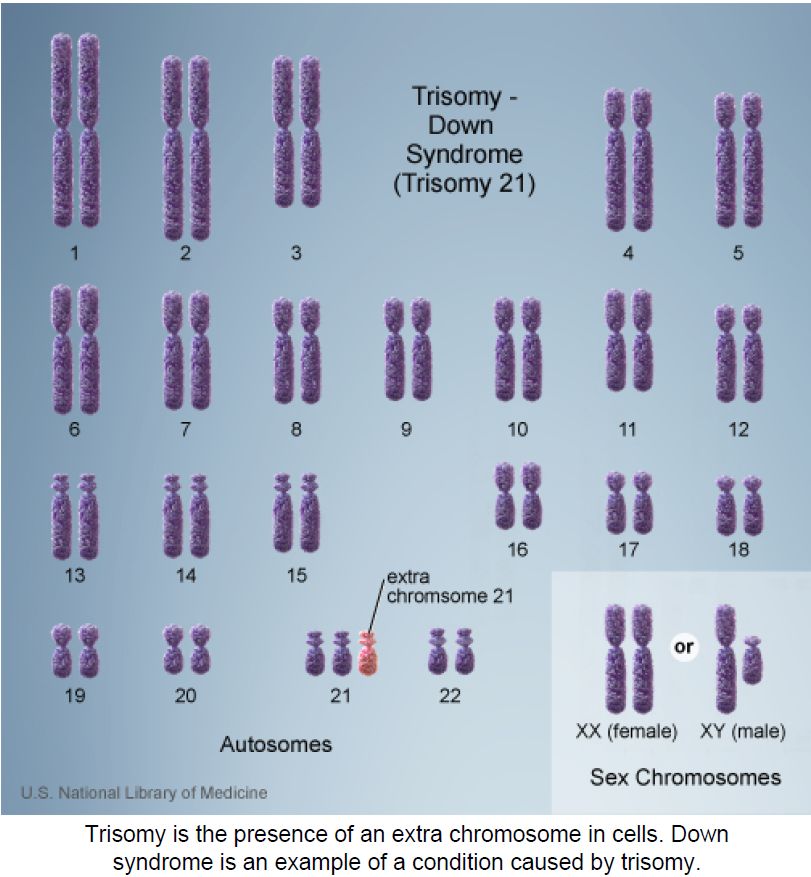
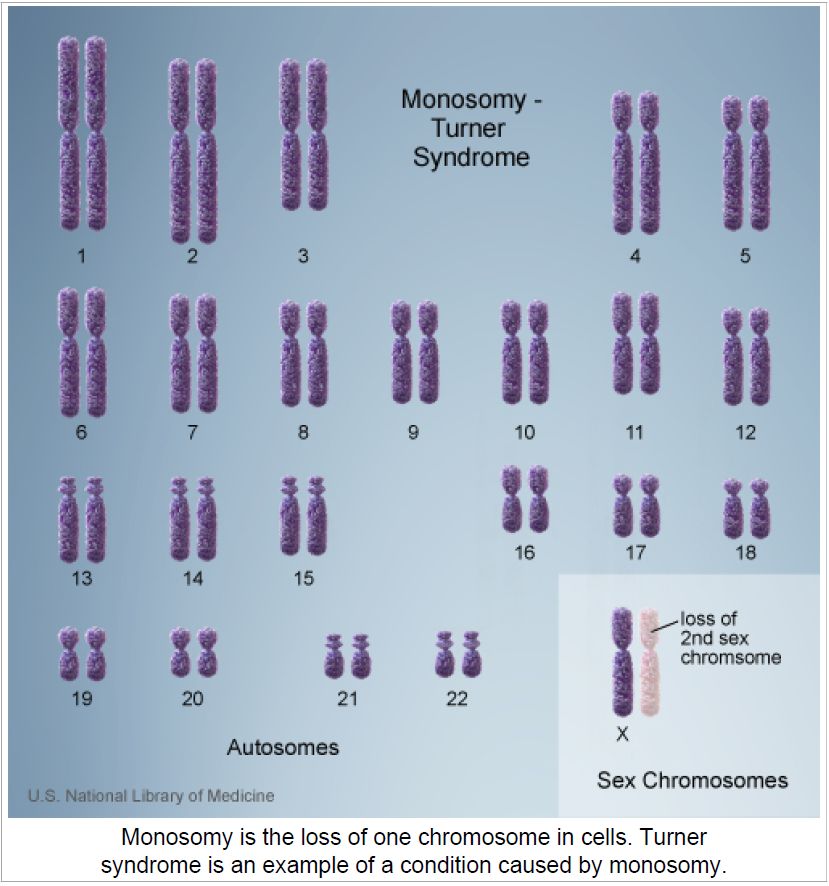
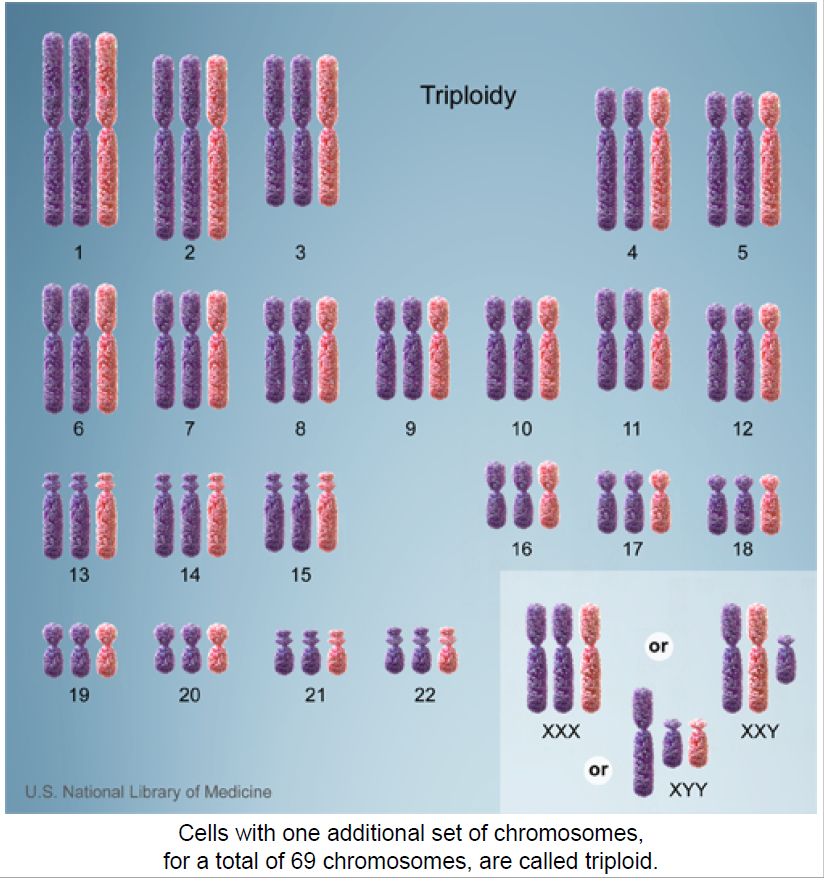
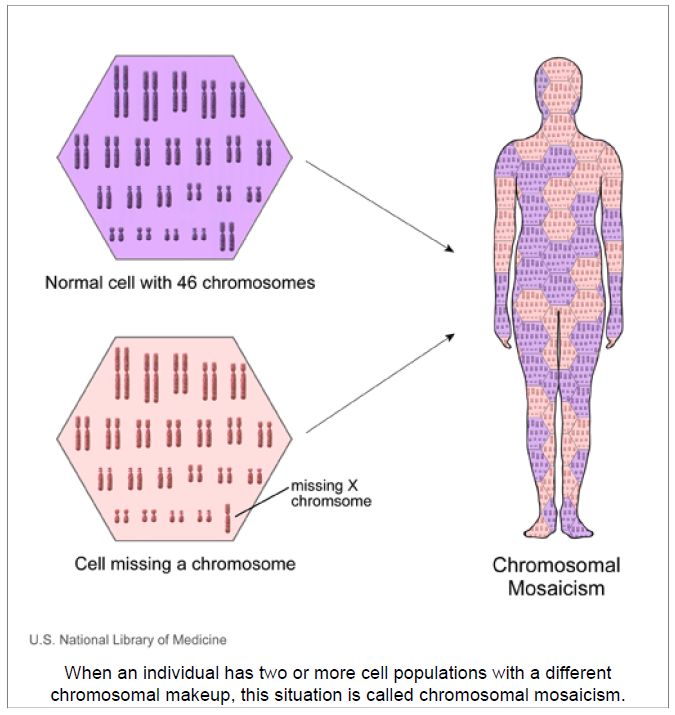
 الاكثر قراءة في مواضيع عامة في الاحياء الجزيئي
الاكثر قراءة في مواضيع عامة في الاحياء الجزيئي
 اخر الاخبار
اخر الاخبار
اخبار العتبة العباسية المقدسة

الآخبار الصحية















 (نوافذ).. إصدار أدبي يوثق القصص الفائزة في مسابقة الإمام العسكري (عليه السلام)
(نوافذ).. إصدار أدبي يوثق القصص الفائزة في مسابقة الإمام العسكري (عليه السلام) قسم الشؤون الفكرية يصدر مجموعة قصصية بعنوان (قلوب بلا مأوى)
قسم الشؤون الفكرية يصدر مجموعة قصصية بعنوان (قلوب بلا مأوى) قسم الشؤون الفكرية يصدر مجموعة قصصية بعنوان (قلوب بلا مأوى)
قسم الشؤون الفكرية يصدر مجموعة قصصية بعنوان (قلوب بلا مأوى)


















